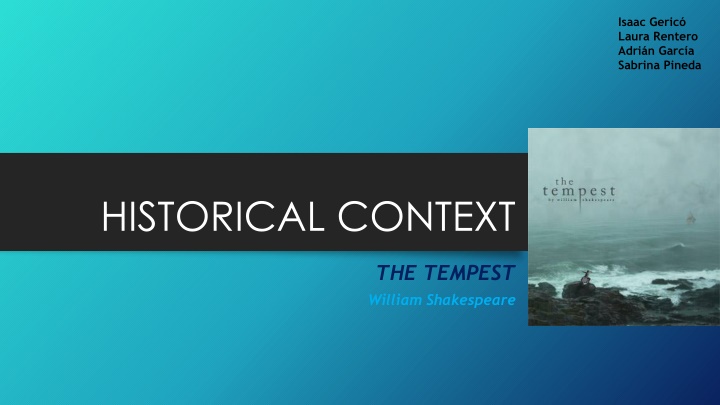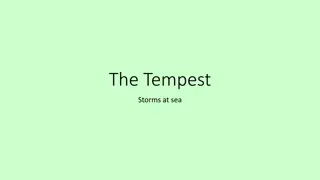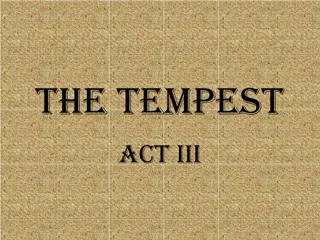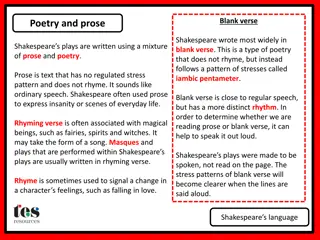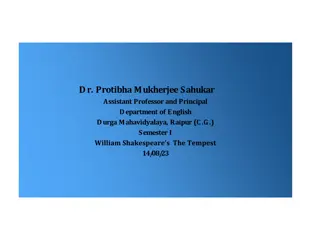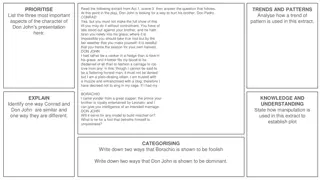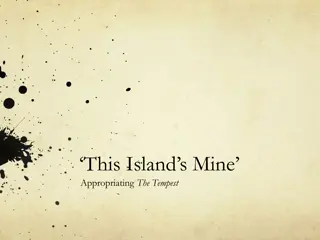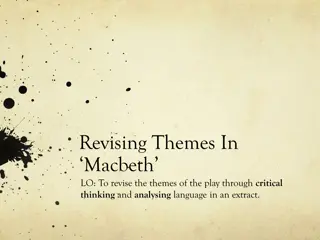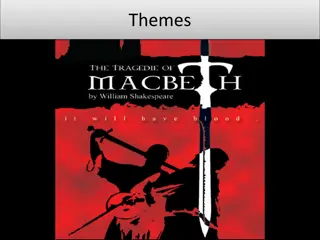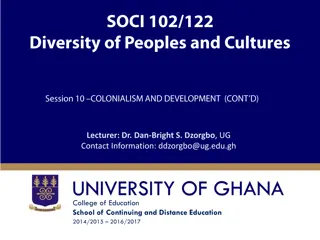The Tempest: Exploration of Colonialism, Magic, and Power Dynamics in Shakespeare's Play
The Tempest, written by Shakespeare in the early 17th century, delves into themes of colonialism, post-colonialism, witchcraft, and power dynamics. Through the characters of Prospero and Caliban, the play explores the complexities of control, resistance, and cultural dominance. The historical context of the play's creation and performance sheds light on its significance in portraying the societal issues of that time period.
Download Presentation

Please find below an Image/Link to download the presentation.
The content on the website is provided AS IS for your information and personal use only. It may not be sold, licensed, or shared on other websites without obtaining consent from the author.If you encounter any issues during the download, it is possible that the publisher has removed the file from their server.
You are allowed to download the files provided on this website for personal or commercial use, subject to the condition that they are used lawfully. All files are the property of their respective owners.
The content on the website is provided AS IS for your information and personal use only. It may not be sold, licensed, or shared on other websites without obtaining consent from the author.
E N D
Presentation Transcript
Isaac Geric Laura Rentero Adri n Garc a Sabrina Pineda HISTORICAL CONTEXT THE TEMPEST William Shakespeare
Table of contents Introduction 3 Colonialism. 4-6 Witchcraft and magic. 7-9 Romanticism. 10 Importance of the Masque. 11-12
Introduction The Tempest probably was written in 1610 1611, and was first performed at Court by the King s Men in the fall of 1611. It was performed again in the winter of 1612 1613 during the festivities in celebration of the marriage of King James s daughter Elizabeth. This play belongs to the set of what authors have called late romances by Shakespeare. (Where we can find also romances like Cimbelino , Pericles, Prince of Tyre and The Winter s Tale .
Colonialism (I) Colonialism and post-colonialism, who began much earlier with the Discovery of America, was a big issue during Shakespeare s time. Firstly, because it was a new era of travel and discovery in Elizabethan s reign. Second,the play itself is a brilliant social commentary of the principles and effects of colonialism.
Colonialism (II) There are different interpretations of Prospero s capture of Sycorax s land and his treatment of the natives of the island. It can be also interpreted as a post-colonial work because of Caliban s resistance to colonial power using the language taught by the colonizer. The fact that Prospero imposes his own culture in Sycorax s island is seen as a colonialism interpretation. We can take Prospero as a representative of the Europeans who subdued the land of native Americans and slaved them.
Colonialism (III) In this colonizer perspective, Caliban is seen as an inferior entity, while Prospero represents the knowledge, the light and is the person who brings the civilization mission in the land. But if we see the novel through the eyes of the colonized people, Caliban shows a disobedient attitude towards the colonizer Prospero from the very beginning of the play. This shows that Caliban have in some way learnt the domination lessons taught by Prospero.
Witchcraft and magic (I) Performing an analysis of The Tempest would not be complete without a proper treatment on the theme of magic Shakespeare gives importance to the interest that the king had for matters which are linked to the witchcraft and magic. These matters where taboo in this age (XVI and XVIII).
Witchcraft and magic (II) Magic was the hopeful component quintessential. Magic consists of a liberation from the divine authority. Jacobo I is responsible for condemning to death al those on which there was a suspicion of carrying out such actions. These elements operate as triggers for the tragedy, or explain, or support it in its entirety, as in The Tempest happens.
Witchcraft and magic (III) Magic was basically a bailout of those ancient knowledge and practises that medieval theology had fought. It was a magic which installed to the man in the centre of the universe. Magic is also a nod referred to the political climate of the time. Magic and colonial enterprise were linked in some way and they were radical transformative of reality, because they offered adventures, riches and glory.
Romanticism In XVIII century Romanticism had a good influence in the reign of Jacobo I and his successors. In a situation when the british monarchy wanted to get profits in american lands the Romanticism was the best option. One of his characteristic was the revolutionary character and feelings. His main aim was the search for freedom.
Importance of the masque The masque appears in fourth act of The Tempest and later it was and important form of court entertainment. It was designed to show monarch s glorify. In this way it had a political purpose as well as entertained. The desire to recapture the past was another function of masque.
Importance of the masque (II) Pastoral themes in masque also responded to time now ended. this desire for a The country life ignored the realities of an agrarian life where a hard winter and scarce of crops are forgotten in the last times. Scenery, costumes or music were essential elements to elaborate the masques, and during the Jacobean Period these became more ornate and expensive to stage.
